You are here
Risky Business: Internet Addiction
The Internet is a wild and wonderful place which has forever changed the way we live, learn, and work – but when a person can’t find a balance between their time online and their time offline, it can mean problems for their mental health.
America is online
 |
88.5% of Americans are Internet users. [1] |
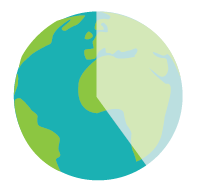 |
Yet less than 40% of the world has Internet access. [2] |
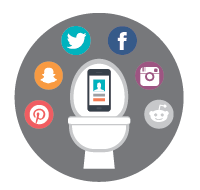 |
40% of young adults (ages 18-24) use social media in the bathroom. [3] |
 |
An estimated 75% of Americans use a smart phone, tablet or mobile device to get online. [4] |
For some people, going online becomes an addiction
There is no one definition for internet addiction; however, it is generally agreed upon that people who are addicted to the Internet have trouble filling personal and professional obligations because of their online activities, and their use of the Internet causes strain on relationships with family and friends. People who are addicted to the Internet often experience negative emotions or withdrawal symptoms when their Internet access is restricted.
Internet Addiction may also be called computer addiction, compulsive Internet use, Problematic Internet Use (PIU), Internet dependence, or pathological Internet use. [5] Researchers estimate that 6% of people are addicted to the Internet. [6]
There are 5 types of Internet addiction [7]:
 |
Cybersexual: Cybersex and Internet porn |
 |
Net compulsions: Online gambling, shopping, or stock trading |
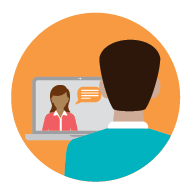 |
Cyber-relationships: Social media, online dating, and other virtual communication |
 |
Gaming: Online game playing |
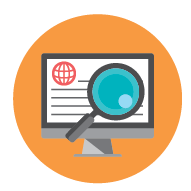 |
Information Seeking: Web surfing or database searches |
Why do people become addicted to the internet? [8]
- Accessibility: Most Americans can get online easily and almost immediately, at any time of day or night.
- Control: People can go online when they want and without other people knowing, causing them to feel in control.
- Excitement: Going online gives people a sort of "high." The suspense of bidding in online auctions, gambling, or playing games can be especially thrilling.
The combination of accessibility, control, and excitement make the addicted person want to continue going online.
How is internet addiction related to mental illness?
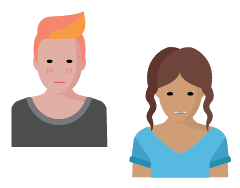 |
Adolescents who struggle with Internet addiction often have other mental health problems like alcohol and substance use, depression, suicidal ideation, ADHD, phobias, schizophrenia, obsessive-compulsive disorder, and/or aggression. [9] |
| Adults who are addicted to the Internet are also likely to have depression, anxiety, alochol problems, compulsive behaviors, sleep disorders, ADHD, anger issues, and/or dissociative experiences. [10] | 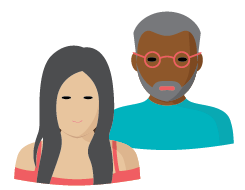 |
 |
There is debate about which comes first for people, Internet addiction or the co-occuring mental health problem. [11] |
Are you dealing with Internet addiction?
If you agree with most of the statements below, it may be time to seek help [15]:
- I think about being online almost constantly. If I'm not online, I'm thinking about the next time I can be or that last time that I was.
- I need to online longer and longer each time before I feel satisfied.
- I have tried to control, reduce, or stop my internet use, but haven't been able to do so successfully.
- I feel irritable or depressed when I try to reduce the amount of time that I am on the Internet or when I can't get online.
- The way I use the Internet has threatened a relationship with someone I care about, my job, or my school work.
- I lose track of time when I'm online.
- I sometimes lie to important people in my life about the amount of time I spend, or the types of activities I participate in on the Internet.
- Being online helps me to forget about my problems or improve my mood when I'm feeling sad, anxious, or lonely.
How is Internet addiction treated?
 |
Some professionals classify Internet addiction as an obsessive compulsive disorder, while others liken it to an impulse control disorder. Therefore, there is no one specific treatment for Internet addiction. [12] |
 |
Internet addiction treatment aims to create boundaries and balance around Internet use rather than eliminating it entirely. However, if there is a certain app, game, or site that seems to be the focus of the addiction, stopping its use may be part of treatment. [13] |
 |
Therapy is almost always incorporated into the treatment of Internet addiction. Cognitive-behavioral therapy (CBT) and group therapy are common. |
 |
Medication may be used to manage symptoms of underlying mental illness and control intrusive thoughts about going online. |
 |
Exercise may be incorporated into Internet addiction treatment to ease the effects of reduced dopamine in the brain resulting from restricted Internet use. [14] |
Take control of Internet use
- Take breaks. For example, try to take a 15 minute break for every 45 minutes of Internet use.
- Fill your free time activities that are physically intense or require a lot of concentration to distract you from thinking about going online.
- Don’t bring your smart phone or tablet with you when you leave the house.
- Keep track of non-essential Internet use (use that isn’t related to school or work) to see if you notice patterns. Do you go online when you are bored? Are you going online to relieve feelings of loneliness or depression?
- Make a list of things of things that you enjoy doing or need to get done that don’t include the Internet. If you feel tempted to go online, choose an activity from your list instead.
If you need help
 |
Take a screen at mhascreening.org to determine if you are experiencing signs of an underlying mental illness. Use the results to start a conversation with your health care provider. |
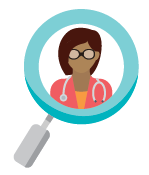 |
Seek specialized treatment. You can find treatment providers using the online SAMHSA Treatment Locator at findtreatment.samhsa.gov or by calling the SAMHSA 24/7 Treatment Referral Line 1-800-662-HELP(4357). |
If you or a loved one is in a mental health crisis, please either visit your local Emergency Room, call 911, reach out to The National Suicide Prevention Lifeline's 24 hour toll-free crisis hotline, 1.800.273.TALK (1.800.273.8255), or text "MHA" to 741741 to receive text-based crisis help.
Sources
[1] http://www.internetlivestats.com/internet-users/us
[2,6]Cheng C, Yee-lam, LA. (2014). Internet Addiction Prevalence and Quality of (Real) Life: A Meta-Analysis of 31 Nations Across Seven World Regions. Cyberpsychology, Behavior, and Social Networking. 17(12): 755-760.
[3] http://www.nielsen.com/content/corporate/us/en/reports/2014/the-us-digital-consumer-report.html
[4] http://www.pewresearch.org/fact-tank/2015/12/08/one-fifth-of-americans-report-going-online-almost-co...
[5] Cash H, Rae CD, Steel AH, and Winkler A. (2012). Internet Addiction: A Brief Summary of Research. Current Psychiatry Reviews. (8) 292-298. Accessed from https://www.ncbi.nlm.nih.gov/pmc/articles/PMC3480687/pdf/CPSR-8-292.pdf
[7] Young, K. (1999). "The research and controversy surrounding internet addiction". Cyber Psychology and Behavior. 2 (5): 381–383.
[8] http://netaddictioncom/netcompulsions/
[9-11]Kuss DJ, Griffiths MD, Karila L and Billieux J. ( ). Internet Addiction: A Systematic Review of Epidemiological Research for the Last Decade. Current Pharmaceutical Design. 20.
[12] Winker A, et. al. (2013) Treatment of internet addiction: a meta-analysis. Clinical Psychology Review. 33(2) :317-329.
[13] Petersen KU, Weymann N, Schelb Y, Thiel R, Thomasius R. (2009). Pathological Internet use - epidemiology, diagnostics, co-occurring disorders and treatment. Fortschritte Der Neurologie Psychiatrie.[Review]. 77(5): 263-71.
[14] Lanjun Z. (2009)The applications of group mental therapy and sports exercise prescriptions in the intervention of Internet addiction disorder. Psychological Science (China). 32(3): 738-741.
[15] Beard KW. (2005). Internet addiction: a review of current assessment techniques and potential assessment questions. CyberPsychology & Behavior. 8(1): 7-14.









this page